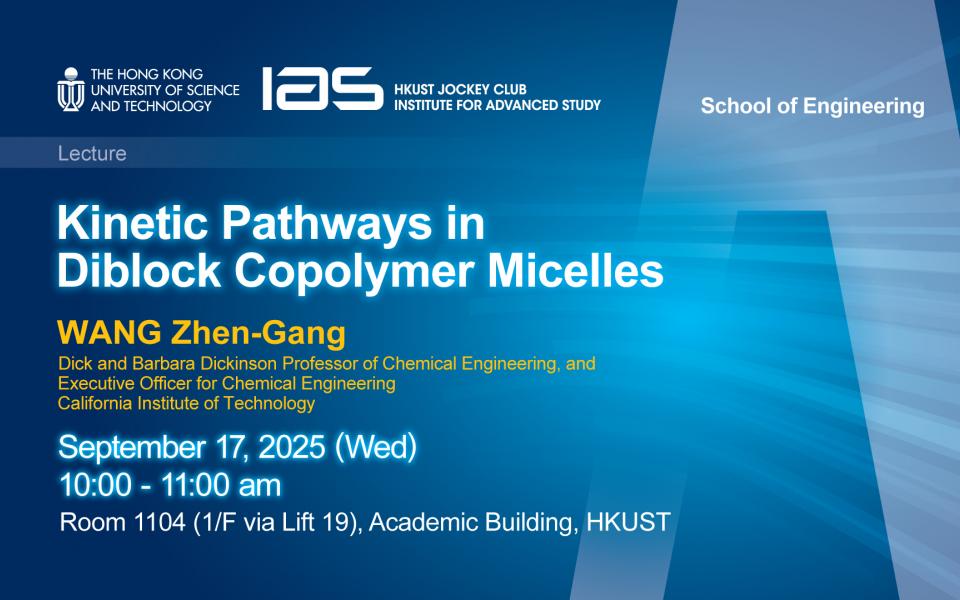IAS / School of Engineering Joint Lecture - Kinetic Pathways in Diblock Copolymer Micelles
Supporting the below United Nations Sustainable Development Goals:支持以下聯合國可持續發展目標:支持以下联合国可持续发展目标:
Abstract
Surfactant- and polymer-based micelles are prevalent in nature and widely used in applications ranging from drug delivery to viscosity modification in oils and consumer products. Micelles equilibrate through two principal processes: chain expulsion/insertion and micelle fusion/fragmentation. While these processes occur on subsecond timescales for surfactants and lipids, longer-chain diblock copolymers face higher free energy barriers that significantly slow equilibration. In this talk, the speaker examines the dominant kinetic pathways in two key processes involving diblock copolymer micelles.
First, the mechanism behind single-chain exchange in strongly segregated micellar solutions is presented. By using enhanced sampling and transition path sampling simulation, the speaker will demonstrate that the Halperin–Alexander mechanism—which assumed a collapsed chain during the escape from the micelle—represents the minimum free energy path in the free energy surface. However, forward flux sampling calculations reveal that the true kinetic mechanism deviates from the minimum free energy path and features a chain that is partially extended into the solution via exploring a more flat part of the free energy landscape. This alternative mechanism yields a free energy barrier that contradicts the Halperin–Alexander prediction but agrees with experimental measurements.
Second, the speaker will investigate the formation mechanism of spherical micelles from thin films of microphase-separated copolymer melts—a method commonly known as direct dissolution (DD) or thin film dissolution (TF). Large-scale coarse-grained molecular dynamics simulation and self-consistent field theory calculation reveal that this process is dominated by the formation and elongation of intermediate cylindrical micelles that subsequently pinch off into spherical micelles. This pathway circumvents the typically high barriers to equilibration by exploiting the relatively barrier-free elongation of metastable or unstable cylindrical micelles. Self-consistent field calculations confirm the presence of a local minimum in the cylindrical morphology, as well as optimal sizes for both cylindrical and spherical micelles that agree closely with molecular dynamics simulations.
About the Speaker
Prof. WANG Zhen-Gang received his BSc in Chemistry in 1982 from Beijing (Peking) University, and his PhD in Chemistry in 1987 from the University of Chicago. He did postdoctoral research first in Exxon Research and Engineering Company and then at UCLA. Since 1991, he has been on the Chemical Engineering faculty at the California Institute of Technology, where he is currently the Dick and Barbara Dickinson Professor. He has also served as Executive Officer (department chair) for Chemical Engineering for 6 years.
Prof. Wang’s research is the theoretical and computational study of structure, phase behavior, interfacial properties and dynamics of polymers, soft materials, and biophysical systems. His current activities revolve around three main themes: charged systems, including polyelectrolytes, salt-doped polymers, and electric double layers; nucleation or more generally barrier crossing in polymers and soft matter; and nonlinear rheology of polymer gels and entangled polymers.
Prof. Wang is a fellow of the American Physical Society and an elected member of the US National Academy of Engineering. He is recipient of several significant awards and honors, including the Camille Dreyfus Teacher–Scholar Award, the Alfred P. Sloan Award, the Braskem Award from the American Institute of Chemical Engineers (AIChE), the AIChE Alpha Chi Sigma Award, and the American Physical Society Polymer Physics Prize. In addition, he was awarded the Richard P. Feynman Prize for Excellence in Teaching, Caltech’s highest teaching honor.
Prof. Wang has served on the editorial advisory boards of Journal of Theoretical and Computational Chemistry, Macromolecules, ACS Macro Letters, Giant, Acta Physicochimica Sinica, and Science in China B (Chemistry). He is currently an associate editor for the ACS Journal Macromolecules.
For Attendees' Attention
Seating is on a first come, first served basis.
